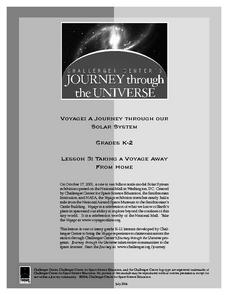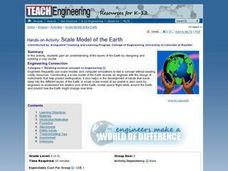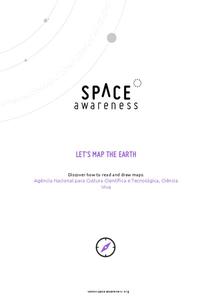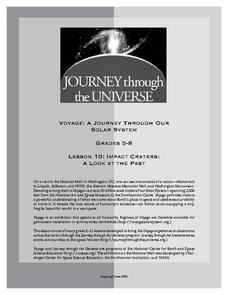Curated OER
Does the Distance Between the Earth and Sun Cause the seasons?
Students reflect upon the concepts of seasons. The concepts are taught using a variety of different teaching approaches. A activities lead to a reflection that will help students to make a cognitive transfer of information form...
Journey Through the Universe
How Far is Far?
The earth only revolves around one thing — and it's not any of your pupils. The lesson includes two activities dealing with the distance to the sun and the moon. First, scholars create a pin hole camera and use the rules of similar...
Journey Through the Universe
Is There Anyone Out There?
What is an alien's favorite game? All-star baseball! Scholars start defining living and non-living. Then, they conduct experiments to research if life exists, keeping in mind that life could be in many forms, not just human.
Curated OER
Earth
First graders define what a planet is and study the planet earth. They examine the effects of the sun on the earth and make a model.
Curated OER
Voyage: A Journey through our Solar System
Students build the Voyage scale model of the Solar System on a playground and "travel" to each planet. They recognize that the Sun and planets are tiny worlds in a vast space, giving them a new perspective on the Solar System, and...
Curated OER
Cosmic Wheels
Students build a scale model of the Solar System and determine the time other planets take to travel around the Sun in comparison to the time of the Earth's revolution. The velocity of the planets are also determined in this lesson.
Curated OER
Jupiter and Io
In this Jupiter and Io instructional activity, students use a diagram of the planet and its moon to find the dimension of the image, the width of the largest feature in the atmosphere of Jupiter, the width of the smallest feature in the...
Curated OER
Taking a Voyage away from Home
Learners experience and participate in a journey through a "Voyage" exhibition of the Solar System and the frontier it covers. They build a dynamic model of the Earth and Sun. Descriptions are given on the relative sizes of the Sun and...
Curated OER
Metrics And Measurements
Students engage in a study of measuring distances between geographical locations on a map. They are able to define and use the map scale in conjunction with the metric system. For this activity they make their own maps and measure the...
Curated OER
Your Galactic Address
Students discover their place in the universe. In this astronomy lesson, students identify their location on various maps that have increasingly larger scales. In the end, the students write their address in terms of their...
Curated OER
Amazing -- Saturn Is So Far Away!
Students work together to create a scale model of the distances between the planets. They write a paragraph to describe Saturn and their make-believe trip to the planet. They identify other characteristics of Saturn as well.
Discovery Education
The Time of Our Life
Mammals are some of the newest organisms to appear on Earth. Young scholars complete an activity that results in a timeline showing the appearance of different types of living organisms. Provided with a list that spans from prokaryotes...
Curated OER
The Transit of Mercury
In this transit of Mercury worksheet, learners read about Earth and Mercury lining up so that Mercury passes across the disk of the sun from the Earth's view. Students solve 3 problems and they determine the diameter of the solar disk...
Curated OER
Scale Model of the Earth
Students work together to create a model of the Earth. They label and identify each layer and describing its properties. They discover how engineers use models to test different concepts.
Curated OER
Earth, Moon, Mars Balloons
Students demonstrate size and orbits of Earth, Moon, and Mars. In this space science lesson plan, students will use balloons to show how the size and distance between the planets and satellite compare.
Curated OER
Mass vs. Weight
Students explore physical science by conducting a measurement experiment. In this mass instructional activity, students identify the differences between mass and weight and define a list of other vocabulary terms. Students utilize...
Curated OER
Antarctica
Students explore why Antarctica is so important to the planet. They investigate the physical characteristics. Students create their own unique treaty of governance for Antarctica and discuss how laws are enforced in Antarctica.
Space Awareness
Let's Map the Earth
Before maps went mobile, people actually had to learn how to read maps. Pupils look at map elements in order to understand how to read them and locate specific locations. Finally, young cartographers discover how to make aerial maps.
Space Awareness
Ocean Acidification
Learn the science behind ocean acidification and its effects on ocean wildlife. Young scientists conduct a laboratory investigation that monitors the acidity level of water. While burning a candle, learners capture the carbon dioxide in...
Curated OER
Rocket Transportation
Students use problem solving skills to lift a load using a balloon rocket. They construct a rocket out of a balloon and use it to carry a paper clip payload.
Journey Through the Universe
Impact Craters: A Look at the Past
The Galle crater on Mars is also known as the Happy Face crater because of its appearance. First, scholars use pebbles and flour to simulate craters and study their properties. They then apply this knowledge to help decipher the history...
Curated OER
Amelia the Pigeon: As a Pigeon Flies
Students follow Amelia's adventure on a satellite image. They use measuring and math skills to determine the distance she traveled.
University of Colorado
Are All Asteroids' Surfaces the Same Age?
There are more than 600,000 asteroids in our solar system. Pupils analyze images of two asteroids in order to determine if they are the same age. They count craters for each asteroid and compare numbers.
University of Colorado
Are All Asteroids' Surfaces the Same Age?
Did you know scientists can tell the age of an asteroid by looking closely at its craters? This final lesson of a six-part series focuses on two asteroids, Gaspra and Ida, in order to demonstrate the concept of dating asteroids. Scholars...























